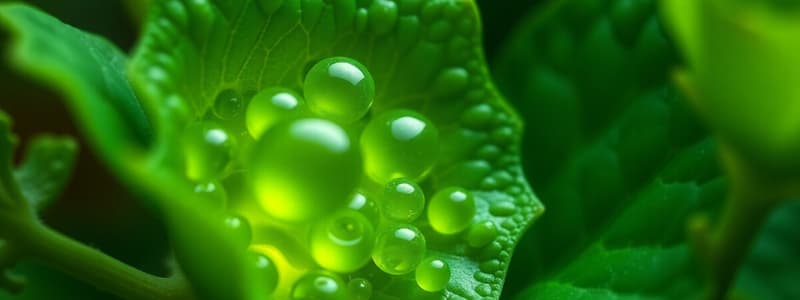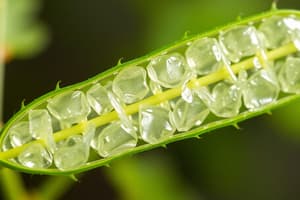Podcast
Questions and Answers
What are the main inputs of photosynthesis?
What are the main inputs of photosynthesis?
- Sunlight and Oxygen
- Water and Chlorophyll
- Carbon Dioxide and Water (correct)
- Oxygen and Glucose
Which molecule plays a significant role in the efficiency of photosynthesis in plants?
Which molecule plays a significant role in the efficiency of photosynthesis in plants?
- Photosystem
- Rubisco (correct)
- ATP
- NADPH
How does the second equation of photosynthesis differ from the first?
How does the second equation of photosynthesis differ from the first?
- It includes extra Oxygen molecules
- It shows additional Water molecules (correct)
- It has fewer reactants
- It represents the production of more Glucose
Which of the following is a necessary component for the photosynthesis reaction to begin?
Which of the following is a necessary component for the photosynthesis reaction to begin?
In photosynthesis, what is the primary product generated from the inputs?
In photosynthesis, what is the primary product generated from the inputs?
Which of the following are reactants necessary for photosynthesis?
Which of the following are reactants necessary for photosynthesis?
What is produced during photosynthesis that is essential for plant energy storage?
What is produced during photosynthesis that is essential for plant energy storage?
Where does photosynthesis primarily occur in plants?
Where does photosynthesis primarily occur in plants?
What role does chlorophyll play in photosynthesis?
What role does chlorophyll play in photosynthesis?
Which component of the chloroplast is responsible for light absorption?
Which component of the chloroplast is responsible for light absorption?
Which of the following statements about chloroplasts is correct?
Which of the following statements about chloroplasts is correct?
What is the stroma of the chloroplast primarily filled with?
What is the stroma of the chloroplast primarily filled with?
What is NOT an input molecule in photosynthesis?
What is NOT an input molecule in photosynthesis?
Which coenzyme is produced during the light-dependent reactions of photosynthesis?
Which coenzyme is produced during the light-dependent reactions of photosynthesis?
What is the primary function of the thylakoid membranes in the light-dependent reactions?
What is the primary function of the thylakoid membranes in the light-dependent reactions?
Which of the following describes the outputs of the light-dependent reactions?
Which of the following describes the outputs of the light-dependent reactions?
During photosynthesis, how is NADPH formed?
During photosynthesis, how is NADPH formed?
What occurs during the light-independent reactions of photosynthesis?
What occurs during the light-independent reactions of photosynthesis?
What is the primary purpose of chlorophyll in photosynthesis?
What is the primary purpose of chlorophyll in photosynthesis?
Which process directly involves the use of ADP during photosynthesis?
Which process directly involves the use of ADP during photosynthesis?
Where does the light-independent phase of photosynthesis occur?
Where does the light-independent phase of photosynthesis occur?
What is the primary function of Rubisco in the Calvin cycle?
What is the primary function of Rubisco in the Calvin cycle?
What undesirable process occurs when Rubisco binds with oxygen instead of carbon dioxide?
What undesirable process occurs when Rubisco binds with oxygen instead of carbon dioxide?
Which two molecules must diffuse from the cytosol into the chloroplast for photosynthesis?
Which two molecules must diffuse from the cytosol into the chloroplast for photosynthesis?
What conditions increase the likelihood of Rubisco binding with oxygen?
What conditions increase the likelihood of Rubisco binding with oxygen?
What does the higher concentration of oxygen in Region R indicate during photosynthesis?
What does the higher concentration of oxygen in Region R indicate during photosynthesis?
Which of the following products is generated from the photorespiration process when Rubisco binds with oxygen?
Which of the following products is generated from the photorespiration process when Rubisco binds with oxygen?
What is the primary function of NADPH in the light-independent reactions?
What is the primary function of NADPH in the light-independent reactions?
Which of the following describes the Calvin Cycle?
Which of the following describes the Calvin Cycle?
How does a high concentration of carbon dioxide benefit plant growth?
How does a high concentration of carbon dioxide benefit plant growth?
What happens to the stomata when a plant needs to conserve water?
What happens to the stomata when a plant needs to conserve water?
How many carbon dioxide molecules are required to produce one glucose molecule?
How many carbon dioxide molecules are required to produce one glucose molecule?
What role does ATP play in the light-independent reactions?
What role does ATP play in the light-independent reactions?
Why do plants want high levels of carbon dioxide and low levels of oxygen for Rubisco to function properly?
Why do plants want high levels of carbon dioxide and low levels of oxygen for Rubisco to function properly?
Which process produces the water that is an output in photosynthesis?
Which process produces the water that is an output in photosynthesis?
What is a potential consequence of increased photorespiration in plants?
What is a potential consequence of increased photorespiration in plants?
In which part of the chloroplast does the Calvin Cycle occur?
In which part of the chloroplast does the Calvin Cycle occur?
Flashcards are hidden until you start studying
Study Notes
Biochemical Pathways Overview
- Photosynthesis converts light energy into chemical energy, primarily in plants, algae, and some bacteria.
- General reaction equation: 6CO2 + 6H2O → C6H12O6 + 6O2.
- Inputs: Carbon Dioxide (CO2) from air, Water (H2O) from soil; Outputs: Glucose (C6H12O6) stored in the plant, Oxygen (O2) released through stomata.
Chloroplast Structure and Function
- Chloroplasts are double-membrane organelles essential for photosynthesis, found in plant leaves.
- Key components include:
- Thylakoids: Membrane systems where light-dependent reactions occur, containing chlorophyll.
- Stroma: Fluid-filled space around grana, site of light-independent reactions (Calvin Cycle) and contains enzymes.
Chlorophyll and Light Trapping
- Chlorophyll is a green pigment absorbing light energy necessary for photosynthesis.
- Includes various chlorophyll types (a, b) and accessory pigments (carotenoids).
- Light energy, absorbed by chlorophyll in thylakoids, excites electrons for further biochemical processes.
Key Coenzymes
- NADP+ is reduced to NADPH, and ADP is phosphorylated to ATP during photosynthesis.
- These coenzymes are critical in both light-dependent and light-independent stages.
Photosynthesis Stages
-
Light-Dependent Reactions:
- Occur on thylakoid membranes.
- Require water, light energy, and chlorophyll.
- Produce ATP, NADPH, and release O2.
-
Light-Independent Reactions (Calvin Cycle):
- Occur in the stroma.
- Use ATP and NADPH from light-dependent reactions plus CO2.
- Involve carbon fixation to convert carbon into glucose via multiple stages.
Rubisco and Its Role
- Rubisco is a vital enzyme in the Calvin Cycle, catalyzing the reaction between CO2 and ribulose bisphosphate (RuBP).
- It can also erroneously bind with O2, leading to photorespiration, a wasteful process reducing photosynthesis efficiency.
Photorespiration
- Occurs when Rubisco binds with O2 instead of CO2, leading to less glucose production.
- More likely under conditions of high O2 and low CO2 as well as high temperatures.
- Results in the production of waste products (H2O2 and NH3) and energy depletion (ATP).
Importance of Substrate Concentration
- Optimal function of Rubisco requires high levels of CO2 and low levels of O2.
- Plants regulate stomatal openings to balance gas exchange, affecting photosynthesis.
- Stomata closure conserves water but can lead to increased O2 buildup if CO2 intake is inhibited.
Exam Preparation
- Understand input/output relationships in photosynthesis.
- Familiarize with chloroplast components and their specific roles.
- Be prepared to discuss the implications of Rubisco's dual substrate nature and the impact of environmental conditions on photosynthesis efficiency.
Studying That Suits You
Use AI to generate personalized quizzes and flashcards to suit your learning preferences.




